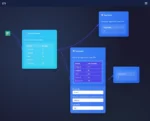Data is rapidly becoming one of the most valuable assets in the world. In the coming years, we can expect to see a number of emerging trends and technologies that will shape the data industry. In this article, we will examine some of the key predictions for the future of data over the next five years.
Artificial intelligence (AI) and machine learning (ML) are two technologies that are poised to have a significant impact on the data industry. AI and ML are already being used to automate data analysis and decision-making processes, and we can expect to see even more widespread adoption of these technologies in the coming years. This will lead to more accurate predictions and better decision-making across industries.
Learn more about various machine learning techniques like Part of Speech tagging.
Blockchain is another emerging technology that is expected to play a significant role in the data industry over the next five years. Blockchain is a secure, decentralized ledger that can be used to record and verify transactions. This technology has the potential to transform data management by providing a secure, transparent, and tamper-proof way to store and share data.
The Internet of Things (IoT) is a network of interconnected devices that can communicate with each other and exchange data. As more devices become connected to the internet, the amount of data generated by IoT devices is expected to increase exponentially. This will create new opportunities for businesses to use data to improve operations and customer experiences.
As the amount of data being generated continues to grow, concerns about data ethics and privacy are becoming increasingly important. In the coming years, we can expect to see more regulations and standards around data privacy and ethics. This will require businesses to be more transparent about how they collect, use, and protect data.
Quantum computing is a technology that uses quantum mechanics to perform calculations. This technology has the potential to revolutionize data processing and analysis by enabling much faster processing and analysis of large datasets. While quantum computing is still in its early stages, it is expected to play a significant role in the future of data.
In conclusion, the future of data is filled with exciting possibilities. From AI and machine learning to blockchain and the IoT, the data industry is poised for significant growth and transformation over the next five years. As businesses and individuals alike navigate this rapidly evolving landscape, it will be important to stay up-to-date with emerging trends and technologies and adapt to changing market conditions. By doing so, we can unlock the full potential of data and drive innovation and growth in the years to come.

























